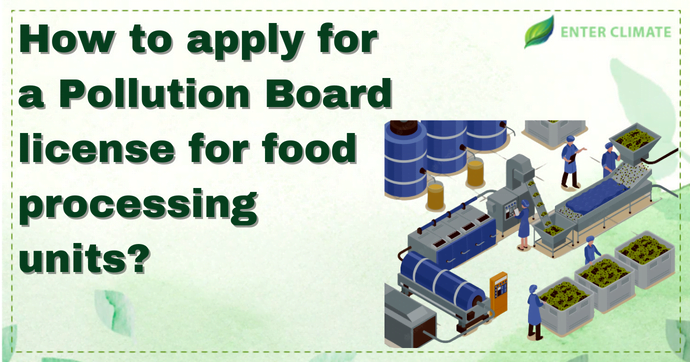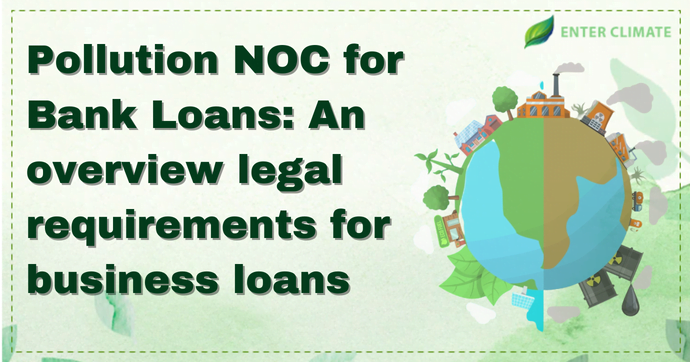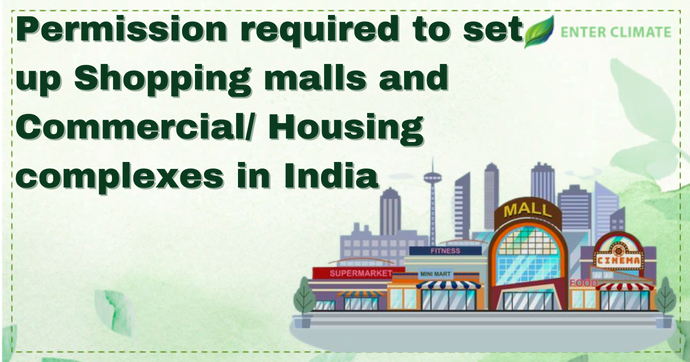How to apply for a Pollution Board license for food processing units?
 31 Dec, 2022
31 Dec, 2022 
In India, the key segments of the Food Processing industry are Food retail, the dairy sector, fruits and vegetables, poultry & meat processing, fisheries, etc. Most agricultural products that need processing are locally grown in different parts of the country. Major sectors in the food processing industry in India are edible oils, grains, sugar, beverages, and dairy. Food being a necessity for all, maintaining a standard and hygiene in the processing sector becomes crucial for the government too. This has led to the development of stringent laws and guidelines governing the food processing industry in the form of a Pollution Board license for food processing units and waste management authorisation. However, at the same time, the government has been tirelessly pushing for the growth of this industry. Many proactive government policies with attractive fiscal incentives have been announced that benefits entrepreneurs who want to set up businesses in this segment. To start a food processing unit, the entrepreneur must acquire a series of licences and NOCs. Food Licence or FSSAI licence and Pollution Board license for food processing units are the two licences that this article will focus on.
Waste generated by Food Processing units
Food processing industries are increasingly fulfilling the need to store and process agricultural and horticultural produce. The Indian food industry has emerged as a major producer of processed foods globally and ranks fifth in size in the world, and is contributing nearly 6 per cent of the country’s GDP. Now, this huge industry does generate industrial waste in large quantities. Processing activities require running machinery and the use of boilers. The process releases solid waste and discharges wastewater. Certain industries, like milk processing units, come under the red category of industries as they are both water and air-polluting. The bulk of the waste generated by the different food processing industries also includes remnants of the food left after processing the desired parts, rotten food items, packaging waste etc. The primary concern related to the disposal of food waste in landfills is that it leads to methane production, a greenhouse gas. Another related waste is the air emissions from the machinery and DG sets that run on fuel. Due to the varying nature of waste generation, the Pollution Board license for food processing units is important.
Process of Applying for a Pollution Board license for food processing units
The applicant must visit the online consent management and monitoring system (OCMMS) of the concerned SPCB/PCC and apply. The step-by-step process for the Pollution Board license for food processing units is as follows.
Step 1: Applicants must register at the OCMMS portal using their personal details.
Step 2: Using the User id and password generated, the applicant must log into the portal and fill out the Common Application form and create a unit.
Step 3: Next, the user must select the “Certificate/ NOC/ Permission” option and then select the department and choose the option of “Consent to Establish” and proceed.
Step 4: Next, the applicant must fill in other relevant details and submit the application form and finally pay the required fee through the “Pay consolidated Fee” option
After successful payment of fee, the application will be directed to the regional office (RO) of the concerned SPCB/PCC. The RO will process the application and raise queries in case of an issue or incomplete documentation within seven days of applying. The documents needed while applying for a Pollution Board license for food processing units are as follow.
- Duly filled application
- Signed Undertaking
- Site Plan/layout plan
- Detailed Project Report with total investment.
- Details of point sources of industrial effluents and air emission.
- Details of the manufacturing process, list of machinery, the capital cost etc.
- Source of water, water balance in the area and quantity required.
- Land documents such as rent /lease agreement
- Industry Registration
- Balanced Sheet by CA
- Details of pollution control devices
- Laboratory analysis report of emissions and wastewater
- Any other permission required from the State Government.
The following explains the details of registration and site inspection processes at the time of applying for a Pollution Board license for food processing units.
|
Application and Fee Submission The applicant has to submit the online form under the respective category in which the unit falls when applying for the Pollution Board license for food processing units, along with documents and the applicable consent fee. The Board will scrutinise the documents and notify the applicant in case of any doubt. |
Inspection of the unit An Inspector will conduct an inspection of the food processing unit before the issuance of Consent to Operate. He will collect random samples of wastewater and air samples and prepare a site inspection report. The officer will also check the installed pollution control measures. |
Issue of Pollution Board Licence Based on the inspection report, the Pollution Board Licence will be issued. The application for Pollution Board Certificate for the food processing unit will be processed in a time-bound manner by the board after the receipt of the completed application. |
Other licences needed by a Food Processing Unit
FSSAI Licence: Food businesses having turnover between Rs.12 lakhs to 20 crores annually can apply for an FSSAI state license. However, business operators like small to medium-sized manufacturers, transporters, retailers, storage units, restaurant marketers, distributors, etc., are required to obtain the FSSAI State License Registration. Businesses having annual turnover above 20 crores can apply for FSSAI central license. Eligible food Business Operators like Importers, Manufacturers, and operators in central government like railways, airports, seaports, airports etc., need to take a Central FSSAI license[1]. The documents required in this regard are
- Rental Agreement of Premises
- ID Proof of the Person
- Company Incorporation Certificate
- Partnership Deed
- Pan card
- GST Registration
Note: If the applicant is a private limited company or partnership firm, they should provide a copy of MOA & AOA or Partnership deed.
Pollution Board Licence for Food Processing Unit (Consent NOC)
Food and food processing, including fruits and vegetable processing, has been categorised as the orange category in the CPCB list.
Additional Licence required by Food Processing Unit
- Industry Registration
- Factory Licence
- Shop and Establishment Registration
- Trade License
- Fire NOC
- CGWA NOC for groundwater use.
- Membership of TSDF Facility to dispose of solid and other waste
Advantages of Starting a Food Processing Industry
The following are the advantages of setting up a food processing industry in India.
Incentives by the Government to start Food Processing Industry In India
- PMKSY scheme allocated ₹ 4600 crores for the development of the sector.
- MoFPI approved 28 new local cold chain projects to boost the export framework of the local agri-food sector and reduce food waste.
- The Ministry has also implemented the PM Formalization of Micro Food Processing Enterprises Scheme (PMFME) for providing financial, technical, and business support for upgrading existing micro food processing enterprises.
- The Government aims to boost growth in the food processing sector by relaxing foreign direct investment norms and allowing up to 100 per cent FDI in food product e-commerce through automatic route.
- Under the Mega Food Park Scheme, the government provides financial assistance up to Rs. 50.00 Crore per Mega Food Park project.
Market Overview and Scope of the Food Processing Industry
The export of products under the Ready to Eat (RTE), Ready to Cook (RTC), and Ready to Serve segments registered a growth at CAGR of 10.4% from 2011-12 to 2020-21. India exported more than 2.14 billion dollars worth of processed food products in 2020-21. The major destinations of RTE export in 2020-21 are the USA, UAE, Nepal, USA, Malaysia, and UAE. The total FDI received in the food processing sector from April 2014 to December 2021 was 5.15 billion dollars.
Conclusion
India has achieved an aggro-surplus status from an agro-deficit condition post-independence. The credit for growth not only goes to the huge agricultural output of the country but also to the development in food processing sectors that process and store the grown food grains, fruits and vegetables and extends their shelf life. The government understands the importance of this industry and has installed various checks and balances to monitor this industry. Pollution Control Board licence for the food processing industry and its periodic renewal is, therefore, a prerequisite for the unit to start and operate smoothly. Seeking assistance in the setup, licences and waste management formalities is, therefore an important decision which the entrepreneur should take when starting any food processing business, small or big.
Read our Article: How To Apply For A Pollution Board Certificate For Milk Processing Units?












